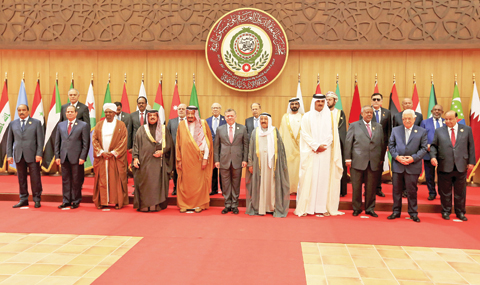Sheikh Sabah hailed for hosting Yemeni talks
 DEAD SEA, Jordan: Arab leaders including HH the Amir of Kuwait Sheikh Sabah Al-Ahmad Al-Jaber Al-Sabah (center right), Jordan's King Abdullah II (center) and Saudi King Salman bin Abdulaziz (center left) pose for a group photo during the Arab League Summit in the Jordanian Dead Sea resort of Sweimeh yesterday. - AP
DEAD SEA, Jordan: Arab leaders including HH the Amir of Kuwait Sheikh Sabah Al-Ahmad Al-Jaber Al-Sabah (center right), Jordan's King Abdullah II (center) and Saudi King Salman bin Abdulaziz (center left) pose for a group photo during the Arab League Summit in the Jordanian Dead Sea resort of Sweimeh yesterday. - APDEAD SEA, Jordan: The African Union Commissioner Moussa Faki hailed yesterday the initiative of His Highness the Amir Sheikh Sabah Al-Ahmad Al-Jaber Al-Sabah on maximizing development and investment in the African continent and its people.
Faki's remarks came in a speech at the 28th Arab Summit, hosted by Jordan. The initiative was announced by His Highness the Amir during Kuwait's hosting of the Arab-African Summit in 2013, which aims at providing African countries with easy loans totaling $1 billion over a period of five years. The goal was to fund Africa's investments in infrastructure in coordination with the World Bank and international institutions.
In terms of African-Arab relations, Faki asserted importance of strengthening the League and this process, pointing out that his attendance at the summit is an affirmation of the African commitment to the positions of solidarity and cooperation with the Arab countries. The Commissioner added that Africa ongoing support for the Palestinian issue in all of its dimensions is a top priority, including fighting terrorist groups, whatever their names is.
Meanwhile, Mauritanian President Mohamed Ould Abdel Aziz praised His Highness the Amir for hosting Yemeni negotiations, affirming his "strong support" for the Gulf initiative aimed at restoring security and stability in Yemen.
"The armed conflict in Yemen continues for the third year in a row, threatening regional peace and security and causing great loss of life and property, a conflict that almost destroyed the unity and harmony of Yemeni society as if there was no Arab and international efforts to address it," President Abdel Aziz said in the opening speech of the summit.
The Mauritanian leader also praised Kuwait's hospitality and patronage by Kuwait's Amir for the inter-Yemeni negotiations since launch of the conciliation process, stressing "strong" Arab support for the Gulf initiative and the United Nations initiative to reach a negotiated solution that would preserve Yemen's unity and stability.
On the Palestinian issue, Ould Abdel Aziz said the two-state solution, which was reached after tough and long negotiations with the blessing of the international community, is the only option available to achieve peace in the region and guarantee the right of Palestinian people to establish their independent state. He also pointed to many challenges in Arab countries, impeding efforts for peace, security and sustainable development, pointing out that the Arab region has been subjected to conflicts, especially in Syria, which have led to increasing complex civilians' displacements and activity by terrorist groups. The Mauritanian leader added that "Syrian parties have not engaged in with a strong will to reach a political solution that fulfills the aspirations of the Syrian people and reinforces security and stability of their country.
He called for immediate end of internal fighting to pave way for signing a comprehensive political agreement that ends blood spilling of the Syrian people and maintains Syria's unity and sovereignty throughout its territory.
On another front, he stressed on the necessity for channeling all support to Arab, African and international efforts to find a comprehensive agreement that will preserve the unity of the Libya's soil, restore stability and security to the troubled nation. He welcomed the political breakthrough in Lebanon and election of a new president to restore political stability in the country.
The Mauritanian president stressed on the need to actively involve women and youth in Arab development. He also urged for development of new mechanisms that would promote integration, economic integration and progress in exploitation of Arabs' resources and promotion of investments and development among their countries. - KUNA










